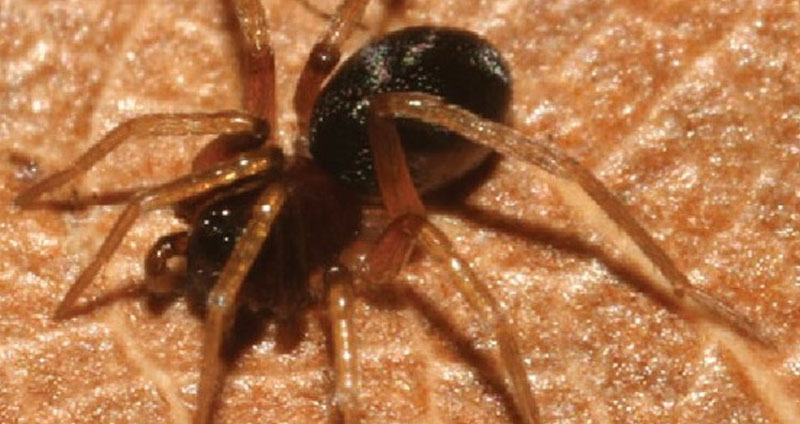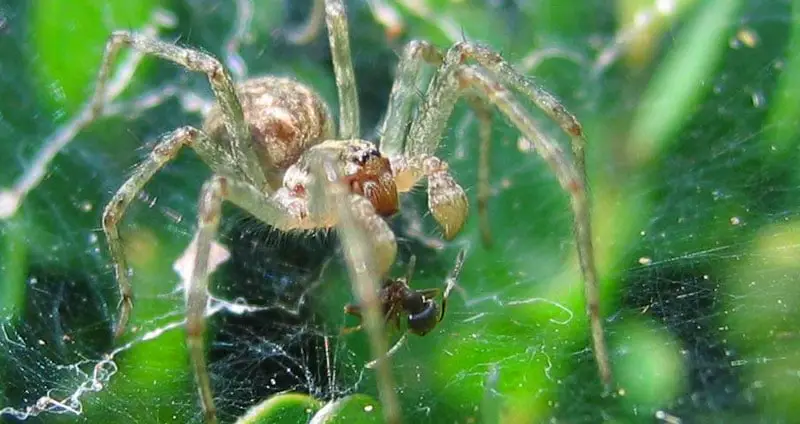Spiders are known as some of the most prominent predators in the insect world. Many spiders create magnificent webs, quickly chase down their prey, and inject venom that subdues their target.
They’re also known to eat a wide variety of different insects and other animals — they aren’t picky in the slightest.
Out of all the insects that spiders eat, some are a bit more uncertain, such as ants. Do spiders eat ants and keep these annoying pests out of your house, or do they turn elsewhere for food?
Table of Contents
Do Spiders Eat Ants?
There are some species of spider that eat ants, but this behavior isn’t very common. Most spiders don’t see ants as food and won’t make an effort to hunt or eat them.
The species that do see ants as food, though, either actively hunt out ants or will go after one that happens to cross its path.
In fact, there are a few species of spider that eat ants as their primary food source. These spiders actually exhibit some interesting behaviors that we’ll discuss below.
So, what are these ant-eating spiders? Do they actually get any nutritional value from these tiny insects?
What Kinds Of Spiders Eat Ants?
As stated, there are several kinds of spiders that eat ants. Most of these don’t see them as a primary food source, but will gladly eat one if presented with the opportunity.
- Daddy long legs
- Widows/false widows
- Crab spiders
- Lynx spiders
- Jumping spiders
- Wall spiders
There is also a family of spiders that survive primarily off of ants, and they do so in a unique way.
Ant Spiders
Ant spiders, or spider from the family Zodariidae, are small spiders that are found on several different continents.
These spiders are unique because they’re daytime hunters and live alongside ants, closely mimicking their behavior and their chemical trails. Thus, they’re often called ant mimics.
Not much is known about this family of spider, but there are 84 genera within it, and members of the genus Zodarion appear to only feed on ants.
In fact, they were the focus of a study to determine how they go about eating and benefitting from ants.
Other genus within these family are also known to specialize in eating only ants and/or termites.

Are Ants Nutritious?
For larger spiders, ants are so small that their nutritional value isn’t up to par with the other insects that make up their diet. This is why they don’t put the effort into hunting ants.
However, for smaller spiders, especially ones that eat ants as their primary food source, the nutritional value of an ant actually takes a lot of consideration.
In that study mentioned above, Zodarion rubidium spiders would balance their nutritional intake by eating different parts of the ant.
The front of an ant is packed with protein and contributes to bigger and faster growth for spiders that only ate that part.
The rear of an ant, or its abdomen, is much fattier and doesn’t give the same benefits as the front, but is assumed to contain beneficial nutrients not found in the front of the ant.
So, ants appear to be a great source of many nutrients that would theoretically sustain smaller spiders.
Of course, this nutritional value doesn’t matter when a spider would need to catch and eat 50 ants per day to sustain itself.
What Do Spiders Prefer To Eat Instead?
Fortunately for larger spiders, these creatures can get by on eating almost anything and everything. They’re not picky and are quite hardy, meaning that they can survive off of a varied died consisting of:
- Crickets
- Beetles
- Flies
- Grasshoppers
- Wasps
- Dragonflies
- Other spiders
- Pollen
- Small rodents
- Lizards
- Amphibians
- Birds
A great benefit that spiders have is that they don’t need to eat very frequently at all. Due to their slow metabolism, spiders can live for between 1 month and 2 years without eating.
So, a spider may only need to catch, paralyze, and liquefy an insect every couple of weeks.
However, if a larger spider like a tarantula were forced to live off of only ants, feeding frequency would need to be ramped up immensely.


Very interesting article. I know a lot about insects, but learned so much more from this read. Spiders have always interested me. Thanks